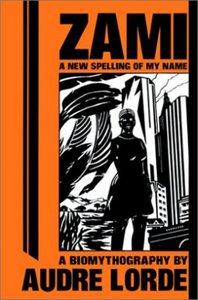Plot summary
Audre Lorde grows up in Harlem in the 1930s and 1940s, a child of Black West Indian parents. Lorde is legally blind from a very young age, isolating her even further from her surroundings and a family from which she does not receive much warmth or affection. Her two older sisters, Phyllis and Helen, are very close, but are rarely mentioned in Zami and Lorde spends little time with them. Her parents and other adults, especially her mother, discipline her harshly for insolence.
Lorde does not speak until age four, when she declares that she wants to read, and promptly follows through on this desire. She witnesses racism from a young age. The family's landlord hangs himself for having to rent his flat to Black people. When the family takes a trip to Washington, D.C., they are not allowed to eat ice cream at a lunch counter because of Jim Crow laws. Despite the rampant racism of this era that Lorde encountered in her daily life, her mother attempted to shield her from it. When white people spit at them during Lorde's childhood, her mother would disparage those low-class people for spitting into the wind.
After getting her first period at age 15, Lorde makes friends with a small number of non-Black girls at Hunter College High School, who label themselves "The Branded". She is elected literary editor of the school's arts magazine and begins writing poetry. After graduation, she leaves home and shares a flat with friends of Jean's (one of The Branded), ceasing contact with her parents and two sisters. At the same time, she also goes out with Peter, a white boy who jilts her on New Year's Eve after finding out she is pregnant. Lorde ultimately decides to get an abortion.
After some unhappy times at Hunter College, she moves to Stamford, Connecticut, to find work in a factory, where the working conditions prove atrocious. Following her father's death, she returns to New York and starts a relationship with Bea, whose heart she ends up breaking when she decides to move to Mexico to get away from McCarthyism. There, she goes to university and works as a secretary in a hospital. In Cuernavaca, she meets a lot of independent women, mostly lesbians; she has a relationship with one of them, Eudora, and works in a library. Back in New York, Lorde explores the lesbian bar scene, moves in with lover, Muriel. Another woman, Lynn, moves in with them and ends up leaving without warning and steals their savings. Finally, Lorde begins a relationship with a mother named Afrekete, who decides to leave to tend to her child. The book ends on a homage to Lorde's mother.
This page is based on this
Wikipedia article Text is available under the
CC BY-SA 4.0 license; additional terms may apply.
Images, videos and audio are available under their respective licenses.
